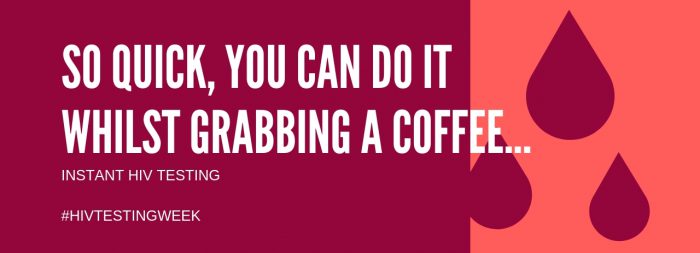Tag: HIV Testing
Is there such a thing as testing too early for STIs?
Yes, in fact, if you test too soon after exposure to an STI aka during the “window period”, you may not get an accurate result.
The ‘window period’ is the length of time it can take between catching an infection and when it will show in a test. It’s important to note that if you are tested earlier than the “window period”, some tests may not detect the STI, even though an individual is infected.
The timing of STI testing after potential exposure varies depending on the specific infection. In general, it is best to wait until a sufficient amount of time has passed for the infection to be detectable, but not so long that the infection has already caused damage.
The “window period” for common STIs:
Chlamydia and Gonorrhoea
– These bacterial infections can be detected 2 weeks after exposure. Symptoms can appear before this so those with symptoms shouldn’t delay testing.
HIV
– Antibody tests can be taken 4 weeks after exposure, whilst instant antibody tests are suitable for use 90 days post contact. Early detection RNA tests can be taken from 10 days after potential exposure. Your healthcare provider will be able to advise which test is most suitable for you.
Syphilis
– Antibody tests for syphilis can be detected 12-weeks after a suspected exposure. Symptoms can appear before this so those with symptoms shouldn’t delay testing, as alternative tests can be taken to diagnose.
If you have been exposed to an STI and are concerned about potential infection, it is recommended to have a sexual health consultation at the earliest opportunity. Your healthcare professional will be able to discuss your risk factors, and then advise the appropriate time interval for tests based on the type of test being used. Your healthcare provider can help you determine which test is right for you, and when to get tested. They will discuss this with you during your sexual health consultation.
It is important to note that some STIs, such as herpes and human papillomavirus (HPV), can have no symptoms, so it is possible to have an infection and not know it. Regular STI testing is the only way to diagnose and treat an infection early, which can prevent complications and reduce the risk of transmission to others.
If you have been sexually active and have concerns about potential STI exposure, it is best to consult with a healthcare provider. They can help you determine the best course of action, including when to get tested and which tests to have.
What STIs can we test for?
Fleet St. Clinic offers testing and treatment for several different STIs including:
– HIV
– Gonorrhoea
– Syphilis
– Chlamydia
– Herpes
– HPV – Genital Warts
Additional tests for symptomatic patients include:
– Mycoplasma
– Ureaplasma
– Trichomoniasis
Results
Rapid results are available for most of our STI checks meaning we can provide you with answers on the same day as your tests. Most swabs are analysed within our onsite laboratory so we can provide you with answers as soon as possible.
Remove unnecessary worry by selecting our fastest turnaround times. These vary for each type of STI, so discuss this with your nurse or doctor during your sexual health consultation.
How regularly should I be getting tested?
Getting tested for sexually transmitted infections (STIs) is an important part of maintaining sexual health. There is no one-size-fits-all answer to when to get tested, as the frequency and timing of STI testing depend on several factors, including:
1. Sexual behaviour: Individuals who engage in higher-risk sexual behaviours, such as unprotected sex, multiple sexual partners, or sexual contact with someone who has an STI, should get tested more frequently.
2. Personal health history: Individuals who have a history of STIs or other health conditions that affect sexual health should get tested more frequently.
3. Age: Young people and older adults may be at higher risk for STIs and should consider getting tested more often.
4. Pregnancy: Pregnant women should be tested for STIs during their first prenatal visit, as well as any other time during their pregnancy as recommended by their healthcare provider.
It is also important to note that some STIs can have no symptoms, so it is possible to have an infection and not know it. Regular STI testing is the only way to diagnose and treat an infection early, which can prevent complications and reduce the risk of transmission to others.
Related services available at Fleet Street Clinic:
HIV (Human Immunodeficiency Virus) is a viral infection that damages cells in your immune system. As a result, it weakens the body’s ability to fight off everyday infections such as the common cold. If you have HIV and get sick with a cold, you are much more likely to experience complications, such as developing pneumonia.
HIV is found in the body fluids of an infected person, such as semen, vaginal and anal fluids, blood and breast milk. It is not found in sweat, urine or saliva. Meaning HIV is typically spread by unprotected sex, the sharing of injecting equipment such as needles, and/ or passed from mother to baby either through birth or breastfeeding.
About National HIV Testing Week
National HIV Testing Week #HIVTestWeek aims to raise awareness of HIV and AIDS. It is an annual national campaign to encourage people to get tested for HIV regularly to reduce the number of people who are diagnosed late or remain undiagnosed.
Out of the 106,890 people in the UK with HIV, 1 in 20 of those do not realise they are HIV positive. Which is why it is so important to make sure everyone gets tested to know their status.
Data from 2019, revealed that 42% of people were diagnosed late. A late diagnosis significantly increases the risk of the virus seriously damaging your health, not to mention the fact that you are more likely to pass the virus on during the period when you are unaware of a positive diagnosis. The only means to address this issue is to increase awareness of the importance of HIV testing.
If you have HIV for a long time without knowing, it can damage your health and shorten your life expectancy. It’s a good idea to test at least once a year (or more if you have unprotected sex with more than one partner). Early detection can give you a better quality of life and reduce the spread of the disease.
While there is no ‘cure’ for HIV, thankfully there are now very effective treatments available that allow those who are HIV positive to live a healthy life and have a normal life expectancy. There is also emergency treatment available if you have been exposed to HIV within the last 72 hours (PEP). Additionally, there is medication available to prevent contracting HIV (PrEP) and even a tablet that will prevent you passing the virus on to anyone else. Access to these treatments is available to anyone HIV positive but the only way to know your HIV status is to get tested.
Know Your Status
At Fleet Street Clinic, we have two types of HIV tests available: an instant test and a blood test. An instant HIV test can provide you with results within a 15 minute nurse appointment. The test is a simple blood test done via a needle prick to the finger and is suitable for use 90 days post-exposure. It is a very simple process with extremely accurate results.

For HIV testing week we’re promoting our ‘So quick you can do whilst grabbing a coffee’ campaign to highlight just how quick an HIV test can be. We want to encourage all to make time to find out their HIV status.
Get Tested
We offer a number of HIV Tests, some of which can be performed in the clinic in just 15 minutes. You can be tested for HIV from as early as 28 days post-contact with a blood test, but don’t worry, during your appointment the clinician will let you know which test they recommend based on your history. Following an HIV test, we are on hand to offer guidance and referrals, should they be required.
Your privacy will be strictly protected.
You can book an HIV Test Online.
For more information on HIV you can visit our HIV page or HIV Prevention England.





